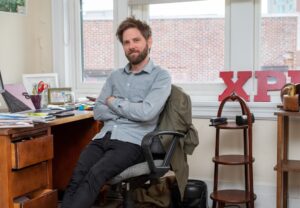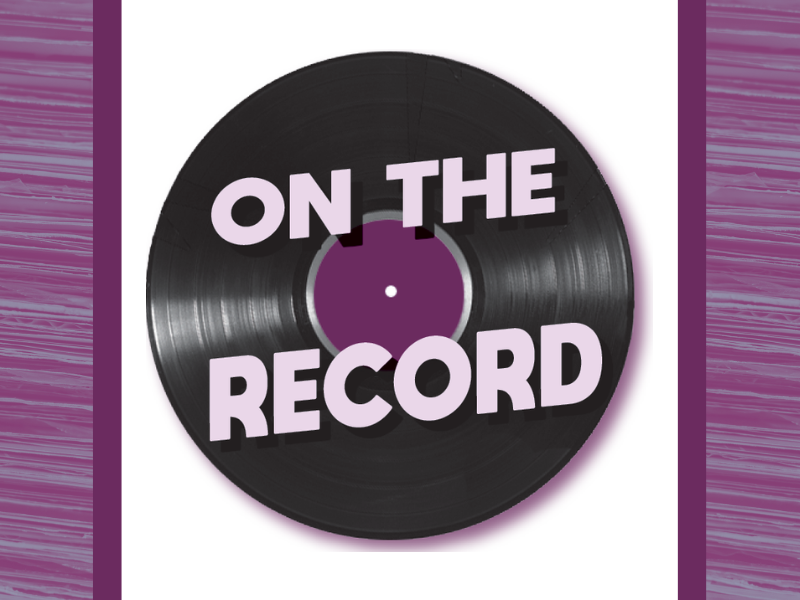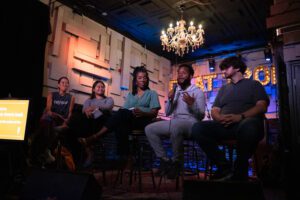By Catherine Komp, Engagement Director
Thomas Calder can’t quite remember where the idea came from. The managing editor at Asheville’s Mountain Xpress has been thinking about election coverage all year. They always put together a comprehensive voter guide ahead of early voting, but he wanted to keep local elections front and center before that. And, he wanted to reach people who might tune out political coverage.
“My background’s also in fiction, so I think a lot in terms of storytelling,” said Calder. “On the local level, how do we make our local candidates more approachable? Beyond just the voter guides that we put out, how do we get at who they are as individuals?”
Calder also wanted something that would appear outside the local news and politics sections. With his previous experience covering the arts, the pieces of his idea started to take shape. Why not sit down with local city council candidates in a location of their choice and listen to a record of their choice?
“I wanted to get them off their talking points, see who they are as people, see what kind of music they like and why they like it, and see if that conversation can naturally branch into their ideas for local policy and local government,” said Calder.
Those sparks led to the “On the Record” series, short profiles of city council candidates where they share things about themselves that wouldn’t necessarily come up in policy-focused surveys and interviews. In the first article, candidate Tod Leaven’s choice of Billie Holiday’s Strange Fruit/Fine and Mellow provides readers with a glimpse of his reflections on the long history of racism and his own white privilege. We also learn about how he parents (it involves the lawyer and veteran auditioning for plays for the very first time) and how his twin sister’s experiences with homelessness and addiction inspired him to run.
The articles aren’t long, about 1500 words or less so far and they’re not heavy with policy positions. But they are packed with nuance about the candidates. The intimacy created through listening to music together brings out vivid snapshots of their lives and motivations.
We had the opportunity to chat with Thomas about how he and the candidates approached this series, some of the surprising things they revealed, and the possibilities it holds for future engagement between local officials and community members. Our interview has been edited for length and clarity.
NC Local: With this series, On the Record, were you thinking about reaching a different audience with election coverage?
Thomas Calder: Yeah, for sure, getting people engaged through a different avenue. On the local level, some folks aren’t as attuned to the local as they are the national so it’s definitely an opportunity to introduce people to these races.
One thing that sticks out to me, during the primaries I was at a show with a friend where City Councillor Kim Roney was speaking. My friend is highly educated, really informed. I overheard him talking to another friend, who asked who Roney was. And he was like, “I think this person is running for something?” And I was like, oh my goodness. My buddy who’s a smart, plugged in person, isn’t as familiar with the local council as I perhaps would have assumed he was.
So that too was in the back of my mind: you shouldn’t make assumptions and you should try to meet people where they’re at and introduce them in ways that might be more interesting to them beyond just policy.
The basic format as you’ve described it is you reach out to the candidate and you let them pick an album of their choice and a place of their choice. How receptive were they? Did you have to do a lot of explaining or convincing?
 There wasn’t a lot of explaining and not a ton of convincing. Everyone was pretty receptive. I wasn’t really thinking about this in terms of the interactions between candidates, but on my second interview it was revealed to me that there had been a lot of chatter among the candidates about “What album are you going to pick?” Just a level of anxiety for the candidates in selecting music, which kind of tickled me. I was like, cool, you’re talking about this, that’s good.
There wasn’t a lot of explaining and not a ton of convincing. Everyone was pretty receptive. I wasn’t really thinking about this in terms of the interactions between candidates, but on my second interview it was revealed to me that there had been a lot of chatter among the candidates about “What album are you going to pick?” Just a level of anxiety for the candidates in selecting music, which kind of tickled me. I was like, cool, you’re talking about this, that’s good.
It’s been really fun to see where the candidates want to meet because in some instances it seems very intentional. There’s one where we met on the Blue Ridge Parkway and it was really fascinating because it didn’t seem like there was any particular reason. The candidate was very forthcoming about his views on government, whereas his personal stuff took a little more time.
Once the album was over, we’re getting out of the candidate’s car and I kept the recorder going. Eventually, just in a very kind of casual way, his story of his connection to the Blue Ridge Parkway and music came out. And I was like, perfect, this is wonderful. I love that it came out in a very organic way, where it wasn’t like me asking him to create a narrative around it.
This seems like a format that could take off and be a new way to get to know candidates.
I know you shouldn’t announce your plans ’cause you’ll hear god laugh at you, but there’s a part of me that thinks this could go beyond campaigns. It could be a format for meeting with and talking to local leaders in a different way that still allows for you to touch on topics that are important to the community, but also just get them to open up. I do think music facilitates that.
I won’t name them and I don’t really note this in the articles, but I had a couple candidates cry during the conversation, just remembering their association with a certain song that played and where they were in their life when they were initially really invested in this album. It’s just a really cool avenue to get to know somebody in a very short amount of time.
How else do you think listening to a record opens up a window into different parts of the candidate that voters should know about?
We all have our pasts and it allows the candidates to open up about previous struggles that they had in a way that it would not have come up in a voter guide questionnaire. You certainly see where some of their past struggles, past experiences have informed who they are today and how these experiences have guided them to seeking their position on council.
Serving on city council wasn’t on any of their vision boards. Everyone was like, “Yeah, this wasn’t in the cards for me, but then this thing happened or that thing happened.” I think that’s something that you don’t often get when you just do the standard voter guide stuff.
In some instances it is tied to music. Kim Roney, who’s currently on council and previously ran for mayor as well, she talks about being a piano teacher for 20 years. Working with students and families over those 20 years was what really got her politically active as far as recognizing “Oh, a lot of the people I work with, a lot of the people I teach are having a really difficult time making ends meet and living in the city and in the city they call home. And what can I do about that?”
So those personal narratives come out in some instances as it relates to music.
This series is for the art section of Mountain Xpress and a lot of people might not make the connection that a local city council member or county supervisor has anything to do with policies that affect the arts. Even in your first On the Record article, the candidate said that’s not the main point of this job. But there are a lot of intersections. Is that coming out through these interviews?
Not directly. There’s some overlap. Certain candidates are definitely more invested and interested in the arts. Some definitely see more of the intersectionality of how they all relate while others are a little more like “the main job for a city council member is X, Y, and Z and these are pet projects that we might be able to fund but first we have to address water, sidewalks, roads, et cetera.”
That’s part of the series too. The reader can gather who may or may not be more closely tied to and interested in those intersectionalities between local government and the local arts, and the fact that there are related policies. Funding from the TDA could go more towards an arts program or grant opportunities. There’s the connection between the housing crisis and the arts community and local studies about the percentage of artists who have left the city and county because of rising costs and what that does to a city that kind of markets itself as this haven for the creative sector. So those topics come up, but there are certain candidates who definitely want to stress that “Yes, I have concerns for the arts, but the at risk communities that I’m more focused on aren’t explicitly the artists.”
But I also remind the candidates that I’m interviewing, I totally recognize police officers, teachers, nurses, these are all community members who, like everybody, are experiencing struggles as it relates to housing, cost of living, etc. But because this article is in the arts section, we’re focused on the arts. So by you answering about the artists, you’re not saying these others don’t matter. But even still, some will be like “Yeah, but I still want to speak to a broader population,” which I think is fine.
What have you learned from this process and will you do it again?
I hope to do it again. And like I was saying, I do have this dream of maybe having it expand beyond just election season.
What I’ve learned is— well, I’ve learned the musical taste of two city council members and four aspiring candidates. And [the experience] reinforces the power of music and its ability to get people to open up. Music allows people to be a little more vulnerable because it’s so powerful and the fact that it can transport you and it can take you back. One candidate was talking about this album being really significant when they were a teenager and you could see in some of their answers like they were channeling that teenage version of themselves.
So just that power to transport and that power to tell stories. There are just so many surprises throughout the six interviews, including the candidates’ relationship to the albums. And in one instance, which readers will have to wait to learn more about, a candidate actually was a member of Rodriguez’s backup band, the subject of 2012 documentary Searching for Sugar Man. So that was really cool to learn.
It’s an opportunity to meet candidates and see candidates in a different light and I hope that it gets people more interested in and connected to those who are serving. A lot of the messaging goes beyond the arts and you see these candidates’ inspiration and the reasons why they’re running. That to me is reassuring. There’s six candidates and they’re coming at it from different angles, but they all have aspects of the city’s interest in their hearts.
It’s also been reassuring to see anybody in the community can run for city council and all these people are coming from different walks of life and they have different reasons and hopefully that might translate to readers who are seeing it and thinking, “Hey, I like The Doors too, maybe I’ll run for City Council or something.”
Find all of Thomas’s On the Record pieces here. Mountain Xpress’s traditional voter guide comes out October 9th, and they’ll be hosting a city council candidate forum October 10th. Also, Happy 30th Anniversary Mountain Xpress! Read their special edition here, which profiles 77-year-old Founder and Publisher Jeff Fobes and shares a behind-the-scenes look at the people who distribute the print edition over 600 miles of mountain roads.




